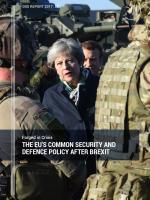EU27 move towards an EU ‘Defence Union’
This week constitutes yet another step towards the materialization of an ‘EU defence union’. On 13 November the so-called ‘PESCO’ provision was launched, which allows groups of willing EU member states to make binding commitments to each other on security and defence. 23 EU member states immediately signed up to participate, and since then, Ireland and Portugal have also joined in, which means that the only hold outs are Malta, Denmark and the United Kingdom. At the European Council summit held on 14-15 December, EU leaders will welcome the PESCO initiative cementing their willingness to significantly strengthen the EU as a framework for European security and defence cooperation. This week, EU foreign ministers will adopt the decision establishing PESCO as well as unveil the first common projects, which will drive their engagement in the years to come. 17 concrete projects are now on the table, including an European Medical Command, the creation of a crisis response centre and a plan for increased military mobility.
This new DIIS report focuses on the recent developments and trends in EU defence and security policy after the Brexit referendum in June 23 2016. Since the watershed decision made by the UK to leave the European Union, the remaining 27 member states have launched a plethora of new proposals aimed at raising the EU’s ambition level for security and defence cooperation as well as showcasing the unity of EU27 and the resilience of the EU project as a whole. The report also evaluates the role played by the UK in EU security and defence cooperation, and discusses how the forthcoming Brexit will affect the EU’s ability to act within security and defence matters. The UK has often played a foot-dragging role in EU security and defence policy, which means that there now will be less opposition towards strengthening the EU as a framework for security and defence cooperation. At the same time however, given the UK’s military and political weight, and the fact that its military capabilities will now be less readily accessible to the EU, the post-Brexit picture will also be one of an EU with diminished military potential. The relationship formed between the UK and the EU post-Brexit will therefore have fundamental consequences for the EU and wider European security, including the relationship between the EU and NATO, and bilateral European defence cooperation.
Some of the some of the key takeaways from the report include:
- The current process for strengthened EU defence and security cooperation focuses on developing joint capabilities rather than on institution building or the deployment of new missions.
- While member states agree on a step-by-step plan towards enhanced capabilities, there is still no clear end-goal for EU security and defence cooperation.
- From a political perspective, there are good reasons for continued involvement of the UK in EU security and defence cooperation post-Brexit. From a legal perspective however, it will be difficult to retain this involvement since the EU treaties only give decision-making competences to EU member states.
DIIS Experts



